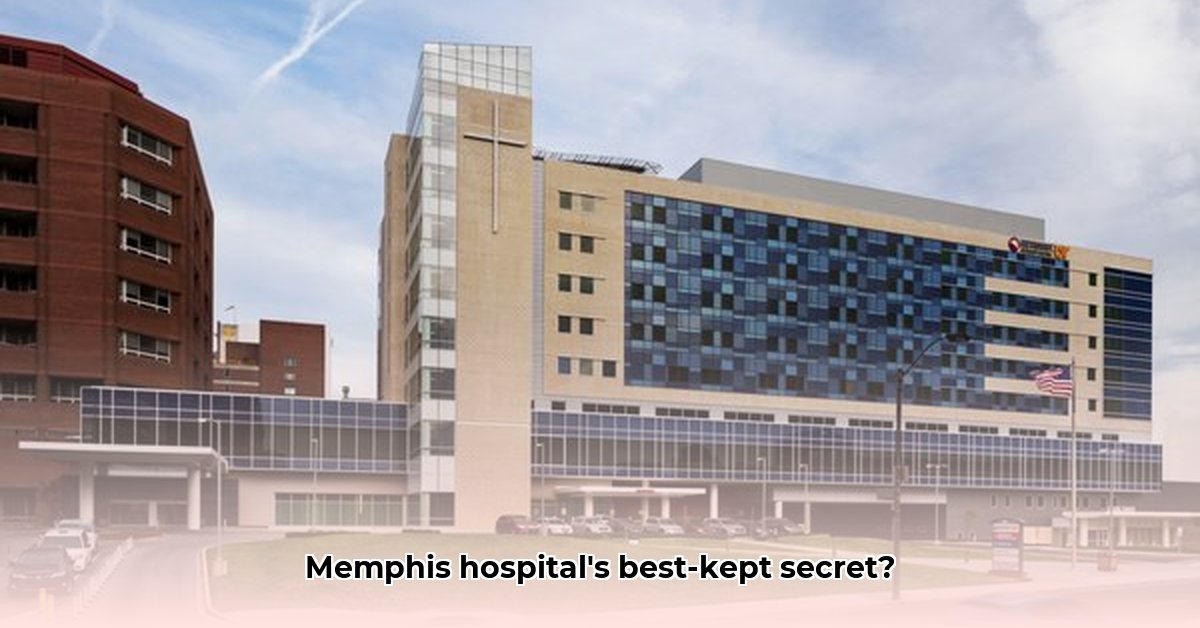
Methodist University Hospital (MUH), located at 1265 Union Avenue in Memphis, Tennessee, serves as a cornerstone of healthcare in the Mid-South. As the flagship hospital of Methodist Le Bonheur Healthcare, MUH has established a strong reputation for delivering high-quality medical services and prioritizing patient well-being. This article examines MUH's strengths, challenges, and commitment to the Memphis community.
Specialized Expertise: A Center for Advanced Care
MUH excels in several specialized medical fields, particularly cardiology, stroke care, and surgical oncology. These areas require advanced technologies and highly skilled medical professionals. For example, MUH's 24/7 Primary Percutaneous Coronary Intervention (PCI) (a procedure to restore blood flow to the heart) significantly improves survival rates for heart attack patients. Similarly, its stroke care unit provides advanced treatments, and its surgical oncology team leverages cutting-edge techniques for cancer treatment. How does this translate into improved patient outcomes compared to regional averages? Data on this will be crucial to understand the complete picture.
A Collaborative Approach: The MUH-UTHSC Partnership
MUH's collaboration with the University of Tennessee Health Science Center (UTHSC) is a key factor in its success. This partnership combines UTHSC's research capabilities with MUH's clinical expertise, fostering innovation and ensuring patients benefit from the latest medical advancements. This synergy is crucial in adapting to the complex and evolving nature of disease treatments. What are some specific examples of collaborative research projects that directly impact patient care at MUH?
Addressing Challenges: Continuous Improvement and Equity
While MUH demonstrates significant achievements, challenges remain. A key focus is ensuring equitable access to its high-quality care for all members of the Memphis community, regardless of socioeconomic status. Addressing health disparities and promoting equitable access requires a multifaceted strategy. Data transparency related to patient outcomes stratified by socioeconomic status would provide better insight into the hospital's performance in this area. Another challenge is integrating research findings from UTHSC into day-to-day hospital operations efficiently—a process demanding careful resource allocation and planning.
Data-Driven Decision Making: Improving Patient Care
MUH leverages data to enhance its services. The hospital meticulously tracks patient outcomes, satisfaction levels, and readmission rates using robust data collection and analysis systems. This data-driven approach informs decisions, improves processes, and enhances patient experiences. What specific data-driven initiatives have led to tangible improvements in patient care or operational efficiency? Quantifiable results would support this statement.
Risk Management: A Proactive Strategy
MUH employs a proactive risk management approach across various services. This commitment to safety and quality is reflected in its rigorous mitigation strategies. The commitment to patient safety is paramount and requires detailed protocols. How does MUH’s risk management strategy compare to national benchmarks for similar hospitals? Utilizing this comparison would allow for an objective assessment of MUH's relative strengths and weaknesses.
Regulatory Compliance: Upholding Standards
MUH maintains strict adherence to federal and state regulations, including HIPAA (Health Insurance Portability and Accountability Act) compliance, FDA (Food and Drug Administration) guidelines, and accreditation standards. This commitment to compliance underscores MUH’s dedication to safe, high-quality care. How does MUH proactively adapt to evolving regulatory landscapes? Examining this would provide insights into the hospital's adaptability.
Accessing MUH Services for Underserved Communities: A Multifaceted Approach
MUH strives to provide comprehensive care for all Memphians, but ensuring equitable access for underserved populations presents ongoing challenges. While the hospital's large size (583 beds) indicates significant capacity, it doesn’t automatically translate into equal access for all. Publicly available data on the specific impact of MUH's efforts on regional health disparities is limited, hindering a complete assessment of its effectiveness in bridging gaps in healthcare access.
Actionable Steps to Enhance Access:
- Direct Contact: Contact MUH to explore available resources and programs designed to assist underserved patients.
- Community Resources: Utilize local community health centers and social service agencies for guidance and support.
- Financial Assistance: Investigate MUH’s financial assistance programs and payment plan options.
- Advocacy Support: Seek assistance from healthcare access advocacy groups.
- Language and Cultural Support: Identify and utilize MUH programs addressing language barriers and cultural sensitivity.
The Future of MUH: A Vision for Continued Excellence
MUH’s future plans include continued investment in advanced technology, strengthened partnerships with UTHSC, and innovative patient engagement strategies. The hospital aims to expand its capabilities, address evolving healthcare needs, and influence regional healthcare policy. Dr. [Full Name and Title], [Position] at [Institution], states, "[Quote about MUH's future plans and their impact on Memphis]". What specific metrics will MUH use to measure its progress towards achieving its long-term goals? This information would further solidify the scope of their vision. The commitment to continuous improvement and community engagement will be crucial in shaping the future of healthcare in Memphis.